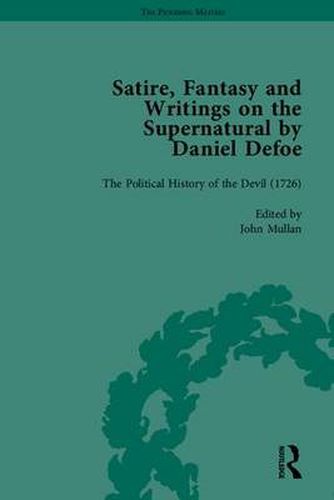Satire, Fantasy and Writings on the Supernatural by Daniel Defoe, Part II
P N Furbank,Daniel Defoe

Satire, Fantasy and Writings on the Supernatural by Daniel Defoe, Part II
P N Furbank,Daniel Defoe
The publication of the 44-volume Works of Daniel Defoe continues with this collection of Defoe’s satirical poetry and fantasy writings, and writings on the supernatural. This new set is, like the rest of this major publishing project, edited to the highest standards, offering readers accurate texts and a wealth of editorial matter including introductions, full explanatory and textual notes, and consolidated index. The new set will be of interest to scholars of the eighteenth century, its politics, religion and literature. The General Editors, Bob Owens and Nick Furbank, are renowned Defoe scholars with a distinguished reputation for their work on the Defoe canon. Their Critical Bibliography of Daniel Defoe (Pickering & Chatto, 1998) is the first full-scale attempt to present a list of works by Defoe with evidence to support each attribution, the fruit of years of work sifting through the many texts attributed to the author. Daniel Defoe (1660-1731) is now best known as a novelist, but in his own lifetime he was much more famous as a political satirist. This was the great age of poetic satire, and Defoe clearly had ambitions to rival poets like Dryden. Defoe’s poetry abounded in savagely satirical sketches of personalities, and lashed corruption and hypocrisy. The importance he placed on poetry as a vehicle for serious political argument is seen in the sheer scale of a major work, the lengthy twelve-book Jure Divino (1706), an elaborate and learned attack on theories of the ‘divine right’ of monarchs. A strain of fantasy runs through much of Defoe’s writing, for example in The Consolidator (1705) which uses a voyage to the moon as a literary device for satirising contemporary life. Elsewhere he adopts the guise of a Turkish spy, shocked at the English propensity for religious quarrels. Towards the end of his life he produced a series of books about the supernatural. These writings are highly original, not least in the teasingly satirical stance Defoe adopts towards superstition and the concept of a personal and physical devil. Defoe was famed in his lifetime as the author of a number of satirical poems, among them The True-Born Englishman (1700), a savagely funny attack on English chauvinism, and A Hymn to the Pillory (1703), published, audaciously, on the day he himself stood in the pillory. His most ambitious work in verse was Jure Divino (1706), in which he satirised ‘divine right’ theories and put forward his own theory of political sovereignty. Defoe was often drawn towards fantasy in his satirical writings. The narrator of The Consolidator (1705) journeys to the moon, where he finds many things remarkably similar to those in England and Europe. Three late works on supernatural topics adopt the same genially satirical stance. The Political History of the Devil (1726) - a favourite with Charles Dickens - ridicules popular notions about Satan. Likewise, A System of Magick (1727) traces in lampooning style the development of the black arts, while An Essay on the History and Reality of Apparitions (1727) dismisses credulous belief in ghosts, though defending the possibility of angelic communication by means of dreams.
This item is not currently in-stock. It can be ordered online and is expected to ship in approx 4 weeks
Our stock data is updated periodically, and availability may change throughout the day for in-demand items. Please call the relevant shop for the most current stock information. Prices are subject to change without notice.
Sign in or become a Readings Member to add this title to a wishlist.

